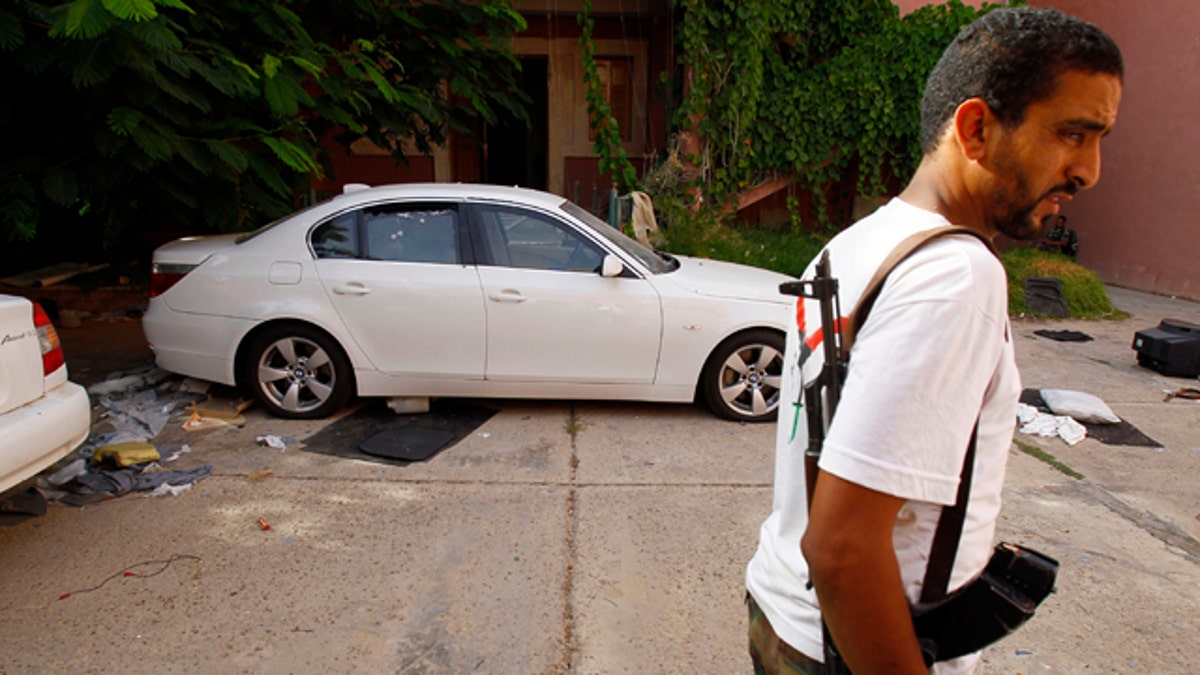
Sept. 1: Libyan rebel stands guards next to the armored car of of the ransacked office of Hannibal, son of Muammar Qaddafi at Bin Achour district inTripoli, Libya. (AP)
BENGHAZI, Libya – Rebel fighters closed in Saturday on one of Muammar Qaddafi's last strongholds, the remote desert town of Bani Walid, but were trying to persuade tribal elders there to surrender without a fight.
A rebel commander said the town has been given until Sunday to surrender. "If they don't raise the rebel flag tomorrow, we will enter with force," said Abdel Razak al-Nathori, who commands one of the brigades advancing on Bani Walid.
Al-Nathori said one of Qaddafi's sons, Muatassim, was in Bani Walid on Saturday, apparently to persuade tribal leaders to stick with the crumbling regime. Another Qaddafi son, Seif al-Islam, was in Bani Walid at some point but fled, said al-Nathori, speaking in the town of Tarhouna, about halfway between Tripoli and Bani Walid.
The elder Qaddafi remains a fugitive, and there has been much speculation about his whereabouts, with Bani Walid being named as a possible hiding place.
Abdel-Baset Naama, another rebel official from the area, said forces from various rebel-controlled towns were gathering along the approaches to Bani Walid. They have cut off access to the town from three directions, he said.
Rebels approached from the north to within 10 kilometers (six miles) of the loyalist town, about 90 miles (140 kilometers) southeast of Tripoli. Rebel commanders said they would go no further, to avoid being accidentally targeted in NATO airstrikes.
Rebel forces are advancing toward a number of key loyalist targets, including Bani Walid, Qaddafi's hometown of Sirte and the the southern loyalist stronghold of Sabha. The rebels have said, though, that they would prefer the towns to surrender instead of taking them by force.
Bani Walid is a base of the million-strong Warfala tribe. In a Thursday audio message, Qaddafi said the Warfala would be among the tribes that would fight to the death for him. Some rebel officials have speculated that Qaddafi, whose whereabouts remain unknown, could be hiding in Bani Walid.
However, Bani Walid also has a history of opposition to Qaddafi. Western diplomats in Libya and opposition leaders abroad reported in 1993 that the air force had put down an uprising by army units in Misrata and Bani Walid. They said many officers were executed and arrested.
In Tripoli, meanwhile, the rebels' deputy prime minister, Ali Tarhouni, said production at two major oil fields would resume Sept. 12 or 13.
Oil production had virtually ground to a halt during Libya's six-month civil war, which ended with Qaddafi's ouster.
Foreign oil companies with interests in Libya have already put out feelers with rebel officials on how to resume work.
